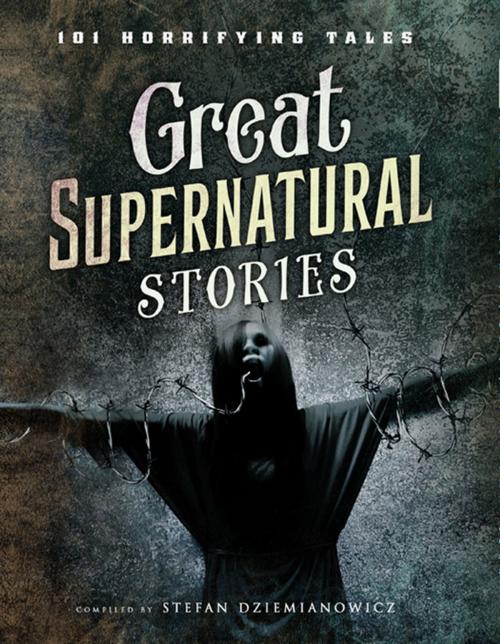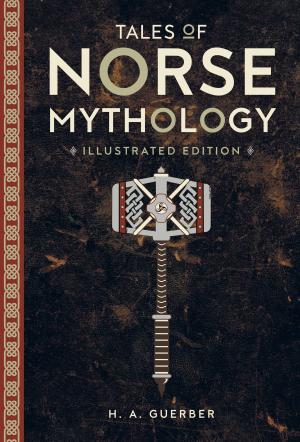Great Supernatural Stories
101 Horrifying Tales
Fiction & Literature, Horror, Science Fiction & Fantasy| Author: | Stefan Dziemianowicz | ISBN: | 9781435166219 |
| Publisher: | Fall River Press | Publication: | July 24, 2017 |
| Imprint: | Fall River Press | Language: | English |
| Author: | Stefan Dziemianowicz |
| ISBN: | 9781435166219 |
| Publisher: | Fall River Press |
| Publication: | July 24, 2017 |
| Imprint: | Fall River Press |
| Language: | English |
Ghosts! Vampires! Zombies! Monsters! The literature of the supernatural abounds with some of the most frightening horrors imagined into existence. They mock our notions of what should be and challenge the security of the boundaries of our rational world. While there are limits to what we consider natural, there are no limits to the supernatural—and, perhaps, no safety from it.
Great Supernatural Stories features 101 horrifying tales of the supernatural that are sure to make you fearful of the dark corners of the room and to curdle your dreams into nightmares. Selections include:
The Bus-Conductor—E. F. Benson. The bus driver looked just like the hearse driver—and what did he mean when he said, “Just room for one inside, sir”?
The Damned Thing—Ambrose Bierce. The being shredded flesh as easily as it flattened grass, but it couldn’t be evaded because no one could see it.
The Ghost of Mohammed Din—Clark Ashton Smith. They say that dead men tell no tales, but the ghost in the haunted house had more in mind than just frightening those who stayed in it.
Jumbee—Henry S. Whitehead. On the island of St. Croix death brings all manner of supernatural marvels out at night, including ghosts, were-dogs, and hanging jumbees.
The Masque of the Red Death—Edgar Allan Poe. When Prince Prospero sealed off his castle in the hope of cheating the Red Death, he didn’t realize that it was just as easy to lock something in as to lock it out.
The Mezzotint—M. R. James. The scene in the framed picture appeared to be changing gradually, and the story it told was a horrifying account of revenge from beyond the grave.
The Terrible Old Man—H. P. Lovecraft. To the three robbers the old man seemed feeble and helpless, but they underestimated the wild talents that he had developed during his years at sea.
Was It a Dream?—Guy de Maupassant. The man had gone to the cemetery to honor the memory of his dead lover, unaware that it was the night that the dead rose to write their true epitaphs on their tombstones.
Ghosts! Vampires! Zombies! Monsters! The literature of the supernatural abounds with some of the most frightening horrors imagined into existence. They mock our notions of what should be and challenge the security of the boundaries of our rational world. While there are limits to what we consider natural, there are no limits to the supernatural—and, perhaps, no safety from it.
Great Supernatural Stories features 101 horrifying tales of the supernatural that are sure to make you fearful of the dark corners of the room and to curdle your dreams into nightmares. Selections include:
The Bus-Conductor—E. F. Benson. The bus driver looked just like the hearse driver—and what did he mean when he said, “Just room for one inside, sir”?
The Damned Thing—Ambrose Bierce. The being shredded flesh as easily as it flattened grass, but it couldn’t be evaded because no one could see it.
The Ghost of Mohammed Din—Clark Ashton Smith. They say that dead men tell no tales, but the ghost in the haunted house had more in mind than just frightening those who stayed in it.
Jumbee—Henry S. Whitehead. On the island of St. Croix death brings all manner of supernatural marvels out at night, including ghosts, were-dogs, and hanging jumbees.
The Masque of the Red Death—Edgar Allan Poe. When Prince Prospero sealed off his castle in the hope of cheating the Red Death, he didn’t realize that it was just as easy to lock something in as to lock it out.
The Mezzotint—M. R. James. The scene in the framed picture appeared to be changing gradually, and the story it told was a horrifying account of revenge from beyond the grave.
The Terrible Old Man—H. P. Lovecraft. To the three robbers the old man seemed feeble and helpless, but they underestimated the wild talents that he had developed during his years at sea.
Was It a Dream?—Guy de Maupassant. The man had gone to the cemetery to honor the memory of his dead lover, unaware that it was the night that the dead rose to write their true epitaphs on their tombstones.















